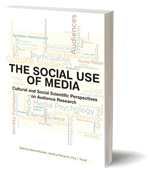Döveling, Katrin & Sommer, Denise (2012). Talking recipients: An Integrative Model of Socio-Emotional Meta-Appraisal (SEMA) in Conversations about Media Content. In Helena Bilandzic & Geoffroy Patriarche (eds.), The Social Use of Media. Cultural and Social Scientific Perspectives on Audience Research (pp. 141-160). Bristol: Intellect.
Emotions play an essential role in communication processes in day-to-day interactions
as well as in media exposure. Scholars are increasingly conceptualizing emotions as a
relevant source of information when examining media contents (Döveling, von Scheve
and Konijn 2011). However, to date, emotions have been approached mainly from the
individual audience member’s perspective. Yet media exposure does not end at the individual level. Mass-mediated messages are processed and discussed with peers to reassure one’s subjective understanding and validate individual positions, emotions and perceptions. Consequently, this chapter elucidates the role emotions play within the communicative processing of media content and vice versa. After a review of the current literature, an integrative model of socio-emotional meta-appraisal (SEMA) in TV reception is proposed conceptualizing media reception as an ongoing emotional negotiation process (cf. Döveling and Sommer 2008). The model integrates relevant theorizing on the complex interrelations between emotions and interpersonal communication before, during and aft er TV use. Subsequently, a case study provides empirical illustration for the model. An experiment reveals how media users actively discuss and evaluate reality TV in their peer group. The results exemplify how emotional responses to media off erings are negotiated and may thus be changed within the process of SEMA.

